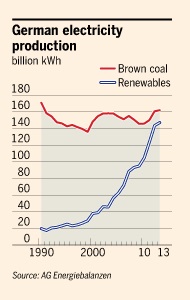According to latest statistics published last week, brown coal electricity production in Germany rose last year to its highest level since 1990, despite the country’s campaign to shift to green sources of energy.
The increase prompted calls from Green politicians and environmental lobbyists for energy reforms to raise the costs of operating coal-fired power stations – especially those using brown coal, a highly-polluting fuel. But brown coal power producers hit back, saying any "forced changes” in Germany’s energy mix would not reduce carbon dioxide emissions in Europe, but shift them to other countries, as reported by FT’s Stefan Wagstyl from Berlin.
The exchanges come as chancellor Angela Merkel’s coalition looks to revise Germany’s energy policies – maintaining commitments to green energy while also controlling the costs and protecting economic competitiveness. At the same time, Berlin is also grappling with an EU probe into subsidies paid to some industries to shield them from high energy prices, notes the above quoted FT article.The German coal figures could reverberate across the EU as discontent grows
over the bloc’s energy policies. The continent’s biggest utilities, in
particular, have lambasted Brussels for measures they say have hurt industry
without delivering hoped-for environmental benefits. Germany, which is the
world’s largest brown coal miner, last year used the fuel – also known as
lignite – to generate 162bn kilowatt-hours of electricity, according to
EnergieBilanz, an electricity industry association. That is up from 161bn kWh
in 2012 and the highest total since the 171bn kWh recorded in 1990, when East
Germany’s ex-Communist plants were still in full flow.

Although energy from renewable sources – such as wind and solar power – has risen steadily over the past decade, to 147bn kWh last year, Ms Merkel’s decision to phase out nuclear power has left a huge gap that only fossil fuels could fill quickly. Hopes that low-emission gas-based plants might make up for the lost nuclear power were dashed by the fact that gas prices have been relatively high and coal prices low.
As a result, Germany’s carbon dioxide emissions, which rose from 917m tonnes in 2011 to 931m tonnes in 2012, are estimated to show an increase of 20m tonnes when figures are tallied for last year. The brown coal industry insists it is becoming more efficient. It has invested in new generators that produce more electricity per tonne of coal. As a result, even though power output rose in 2013, brown coal mining declined 2 per cent, according to Debriv, the industry association.
Meanwhile, the opposition Green party urged Ms Merkel’s conservative-social democrat coalition to encourage use of other fuels. "Whoever is serious about climate protection, must take care that less and less electricity comes from brown coal,” said Bärbel Höhn, a Green environment spokesperson. Jens Tartler, spokesman for the German Renewable Energy Federation, an industry group, urged reform of the EU’s carbon market The EU’s decision last year to remove emissions worth 900m tonnes from trading was "not enough” to boost the market. "That emissions are rising again in Germany [with its commitment to green energy] is a very bad signal to other countries.”
Debriv, the industry association, retorted that to trigger fuel mix changes, carbon prices would have to increase tenfold, which "would have a devastating effect” on electricity prices and competitiveness. The economic and political strains of promoting green energy are growing. The coalition agreement envisages the green share of power generation rising from 25 per cent today to 40-45 per cent in 2025.



